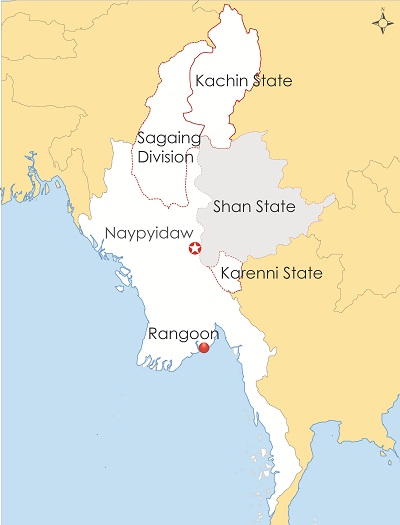




The leader of a Shan political group on Monday called for greater political power for Burma’s ethnic states, saying a federal political system would address tensions that have sustained decades of conflict between the central government and the country’s armed ethnic groups.
Khun Tun Oo, leader of the Shan Nationalities Democratic Party (SNDP), called on representatives of several ethnic political parties and their armed wings as well as civil society groups to draw up a plan to present to President Thein Sein’s government.
“The ethnic conflicts are major problems that Burma is facing currently. We need to build a federal state to solve these ethnic conflicts,” he said, while addressing participants at on the first of a three-day “trust-building” conference in Rangoon.
But the prominent Shan politician and former political prisoner acknowledged that Burma’s ethnic states, several of which are engaged in ongoing armed conflict with government troops, would have to first agree to sit down with government officials to discuss such a proposal.
“It is impossible to build a real state without peace. I am requesting you to discuss [this proposal] openly and fairly in this meeting to build an understanding for peace.”
The SNDP, also known as the White Tiger Party, mainly represents interests of ethnic Shan, which form Burma’s second-largest ethnic group and account for about 9 percent of the country’s population.
It is the next largest party after Aung San Suu Kyi’s National League for Democracy (NLD) in parliament.

President Thein Sein has guided the country down a path of rapid economic and political reform since his quasi-civilian government took power from the former military junta in March last year.
The new government has signed ceasefire agreements with 10 armed ethnic groups, but three rounds of peace talks since November held with the Kachin Independence Army (KIA) in northern Burma’s Kachin state have yielded little outcome.
The Karen National Union (KNU) in eastern Karen state has also been unable to agree on a ceasefire with the Burmese military despite an initial peace agreement signed in January.
The KNU has called for political dialogue on the peace talks outside of parliamentary discussions, whereas the government wants all ethnic armed groups to form political parties and enter the legislature through elections before engaging in such dialogue.
Burmese opposition leader Aung San Suu Kyi last week dismissed suggestions that anticipated economic progress in the country will resolve its longstanding ethnic conflict problem, saying priority should be given to reducing imbalances and inculcating mutual respect among communities.
The International Crisis Group said in a report this month that much of the government’s attention will need to be focused on controlling the country’s multiple internal ethnic conflicts, which it said were a real threat to national stability.
The group called for the government to immediately address tensions in western Rakhine state where clashes between Muslim Rohingyas and Buddhist Rakhines in June and October left about 180 killed and more than 100,000 others homeless, according to official figures.
Reported by RFA’s Burmese service. Translated by Khet Mar. Written in English by Joshua Lipes.